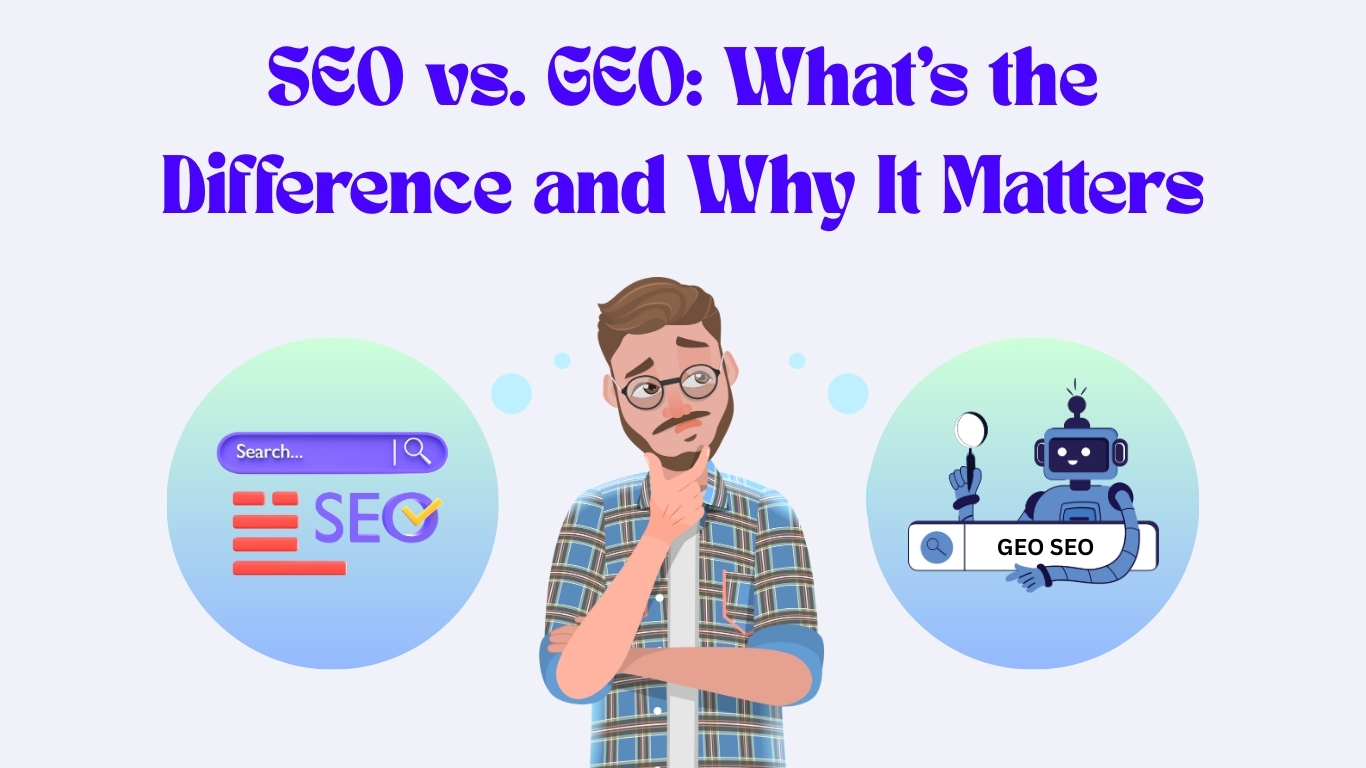When it comes to online visibility, two acronyms dominate the conversation: SEO and GEO. While they might sound similar, these strategies serve distinct purposes in your digital marketing arsenal. Understanding their differences can make or break your ability to reach the right customers at the right time.
SEO focuses on improving your website’s visibility in organic search results across all locations. GEO (Geographic Optimisation), on the other hand, targets local search results to connect you with nearby customers. Both play crucial roles in a comprehensive digital strategy, but knowing when and how to use each one will determine your success.
What is SEO (Search Engine Optimisation)?
SEO is the practice of optimising your website and content to rank higher in search engine results pages (SERPs) for relevant keywords. This strategy casts a wide net, aiming to attract visitors from anywhere in the world who are searching for your products or services.
The foundation of SEO lies in keyword research and content optimisation. You identify terms your target audience searches for, then create valuable content that answers their questions and solves their problems. Technical elements like page speed, mobile responsiveness, and site structure also influence your rankings.
SEO is most effective for businesses that serve customers globally or nationally. E-commerce SEO, SaaS companies, and content creators typically benefit most from this broad approach. The goal is to establish authority in your industry and capture traffic from users regardless of their geographic location.
What is GEO (Geographic Optimisation)?
GEO focuses specifically on improving your visibility in local search results. When someone searches for “coffee shop near me” or “dentist in Chicago,” geographic optimisation determines whether your business appears in those crucial local listings.
Google My Business forms the cornerstone of any GEO strategy. This free tool allows you to manage how your business appears in Google Search and Maps. You’ll need to verify your location, add accurate business information, upload photos, and encourage customer reviews.
Local citations also play a vital role in GEO. These are mentions of your business name, address, and phone number (NAP) across various online directories like Yelp, Yellow Pages, and industry-specific platforms. Consistent NAP information across all platforms signals trustworthiness to search engines.
GEO proves essential for brick-and-mortar businesses, service providers with specific coverage areas, and any company that relies on foot traffic or local customers.
Why Both SEO and GEO Matter
SEO and GEO aren’t competing strategies—they’re complementary forces that strengthen your overall online presence. SEO builds broad brand awareness and establishes your expertise across a wider market. This approach helps you capture potential customers who might not be ready to buy immediately but are researching solutions.
GEO targets high-intent local searchers who are often ready to make a purchase or visit your location. These druggies generally convert at advanced classes because they are laboriously seeking near results. Local searches also frequently happen on mobile devices, connecting you with customers who might be just minutes away from your store.
Many businesses benefit from implementing both strategies simultaneously. A restaurant chain, for example, might use SEO to rank for broad terms like “healthy meal ideas” while using GEO to appear when someone searches for “healthy restaurants in downtown Portland.”
The combination creates multiple touchpoints with potential customers. Someone might first discover your brand through a helpful blog post (SEO), then later search for your local location when they’re ready to visit (GEO).
Building Your Comprehensive Strategy
Launch by assessing your business model and client base. If you serve customers both locally and beyond your immediate area, you’ll want to invest in both SEO and GEO. Prioritise GEO if your business depends primarily on local foot traffic, or focus on SEO if you operate entirely online.
Remember that GEO often delivers faster results than traditional SEO. Local SEO is improving rankings within weeks of optimising your Google My Business profile, while broad SEO efforts typically require months to show significant results.
Track different metrics for each strategy. Monitor local ranking positions and Google My Business insights for your GEO efforts, while focusing on organic traffic and keyword rankings for SEO performance.
The Power of Strategic Focus
Understanding the distinction between SEO and GEO empowers you to allocate your marketing resources more effectively. Rather than spreading your efforts too thin, you can choose the approach that best aligns with your business goals and customer behaviour.
Both strategies require consistent effort and patience, but they reward businesses that commit to providing value to their target audiences. Whether you’re optimising for global reach or local dominance, the key lies in understanding your customers’ search behaviours and meeting them where they are.
Building Your Sustainable SEO Foundation
Sustainable SEO requires patience, consistency, and commitment to serving your audience genuinely. The strategies outlined here won’t generate overnight results, but they create foundations for long-term success that remain stable through industry changes.
Start by auditing your current approach and identifying areas where you can shift from short-term tactics to sustainable practices. Focus on one pillar at a time—whether that’s improving content quality, enhancing user experience, or building genuine relationships within your industry.
Remember that sustainable SEO is ultimately about creating value for real people while making that value discoverable through search engines. When you consistently deliver on that promise, rankings and traffic growth follow naturally, creating the lasting success every blogger seeks.


